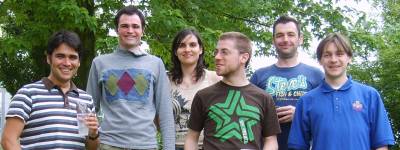This is an old revision of the document!
People
The people behind the AmbientTalk project are: 1 professor, 1 post-doc researcher and 6 PhD students from the Programming Technology Laboratory of the Vrije Universiteit Brussel.
Part of the ambient group in June 2007. From left to right: Jorge Vallejos, Jessie Dedecker, Elisa Gonzalez Boix, Stijn Timbermont, Wolfgang De Meuter, Tom Van Cutsem.
Prof. Dr. Wolfgang De Meuter
Elisa Gonzalez Boix
My area of interest is memory management for distributed systems. More specifically, my research is focused on how to reconcile distributed garbage collection (DGC) with the characteristics of mobile ad hoc networks. I am currently investigating a novel family of DGC called semi-automatic garbage collection and the required language constructs.
Andoni Lombide
I am interested in how to expressively integrate distribution and concurrency with dynamic, object-oriented programming. I am currently looking into programming abstractions that should allow the inherent concurrency of mobile networks consisting of heterogenous devices (such as RFID tags, sensors…) to be exploited in an expressive way.
Stijn Mostinckx
The goal of my research is the development of elegant programming models which allow applications to respond to dynamic changes in their environment. As a means to detect such changes, we explore the Fact Space Model, which provides a means to reason about one's current context.
My ongoing research investigates which abstractions can be used to handle the events produced by an implementation of the fact space model. An interesting path that I am currently exploring is the use of reactive context-aware programming.
Christophe Scholliers
Current-day applications for mobile phones and PDAs are often limited to miniature versions of standard desktop applications such as browsers, calendar and word processing applications. Only a fraction of the available applications allows the mobile devices to interact directly with their environment. One of the reasons for this is that even for the simplest interactions between mobile devices, the implementation needs to deal with a lot of problems that are inherent to a pervasive computing environment (e.g. frequent disconnections, dynamic discovery, etc.)
Last year, I have been involved in the development of (a concrete implementation of) the Fact Space Model, an extension to the tuple space model which provides fine-grained control over the effects of disconnections. Using a declarative language, every device can specify how it will adjust its behaviour in response to dynamic changes in its environment. Currently, I am working on an extension of this model that allows applications to work on shared and replicated data. The use of weak data replication in a mobile environment ensures that there is no need to stop an ongoing application when certain data cannot be synchronized.
Stijn Timbermont
In an Ambient Intelligent setting, various kinds of hardware are involved, each with its own characteristics. To allow abstraction over the different devices, a standard virtual machine approach is not feasible because it is not possible to abstract over all the devices at the same time. Instead, each device will require an individually adapted virtual machine.
This reseach proposes a new way to develop virtual machines for Ambient Intelligence. Instead of manually modifying the virtual machine for of a particular device, the virtual machine can be generated by composing reusable modules. The first step is to determine the set of modules that can be used to build a virtual machine. The next step is to find implementation and composition techniques that guarantee the correctness and efficiency of the generated virtual machine.
Jorge Vallejos
The focus of my research is to investigate the context-awareness property in the field of Ambient Intelligence. My particular interest is to explore the ways in which the computational context surrounding mobile applications, may influence their behaviour. For further information about my work please visit the Context-Dependent Behaviour Adaptations section of this site.
Dr. Tom Van Cutsem
Specific to my PhD thesis, my research lies in uncovering novel referencing and communication abstractions for mobile ad hoc networks. More specifically, I am currently investigating ambient references, which are a set of object-oriented service discovery abstractions.
Within the research track of ambient-oriented programming, I am also particularly interested in the adaptation and application of meta-level architectures and reflection to the AmOP paradigm. Apart from AmOP, my general research interests include dynamic object-oriented programming languages (reuse/composition/object models) and reflection. I am especially intrigued by composition techniques such as traits and delegation.
Former Members
Dr. Jessie Dedecker
My current research topic revolves around collaborative ambient-oriented programming abstractions. This involves abstractions for expressive coordination of groups of ambient objects. In this context I am also investigating replication strategies suitable for disconnected operation.
Apart from my research on AmOP I also have a general interest in dynamic object-oriented programming languages, concurrency and distribution.

